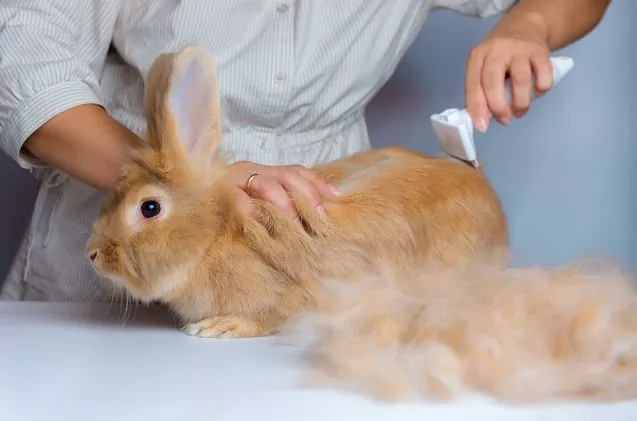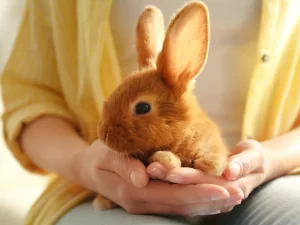In our lives, rabbits are more than just pets; they are friends who make us happy and warm. As a responsible pet parent, it is important to ensure that your pets are healthy and happy by grooming and caring for them properly. This complete guide covers the basics of rabbit cleaning and emphasizes the importance of regular maintenance to keep your furry friend in good condition.
For rabbits, grooming is an important part of their daily routine, which affects their appearance and health. Unlike other pets, rabbits have specific care needs that, when these needs are met, keep them healthy and allow owners and pets to build a strong bond.
1. The Importance of Coat Care:
Rabbit fur can be short and easy to care for or long and manageable. Grooming your rabbit regularly will remove loose fur so he doesn’t eat it during grooming, which can cause digestive problems. If your rabbit has a short coat, you may only need to groom him once a week. If your rabbit has long hair, you may need to do this every day.
2. Clipping Nails:
If your rabbit’s nails are too long, they can become painful or even injured. They can get stuck in the fabric or make it difficult to move. Regularly trimming your rabbit’s nails (every 4 to 6 weeks) will help you avoid these issues. If you are unsure how to safely trim your rabbit’s nails, consult your veterinarian or professional rabbit groomer.
3. Maintain Good Oral Health through Diet:
Rabbits’ teeth continue to grow throughout their lives, so it is important to take good care of their teeth. A diet rich in hay helps the teeth wear down naturally and prevents them from growing too large and causing health problems. Keep an eye on what your rabbit eats; if this changes, it could mean he has a dental problem that needs to be treated by a vet.
4. Cleanliness and Hygiene:
Keeping your rabbit’s living space clean is very important for his health. Change blankets and clean the cage regularly to prevent the growth of harmful bacteria. Pay special attention to their litter boxes, as rabbits often eat while going to the toilet. So it is important to keep this area clean.
5. Be Careful When Bathing:
Rabbits don’t need to be washed as often as other pets, and they can become very stressed by it. A damp cloth will remove most of the dirt from the area. If the animals are very dirty, talk to your vet about safe ways to clean them.
6. Eyes and Ears: The Gateway to Health
Check your rabbit’s eyes and ears regularly for signs of irritation or disease. As long as the rabbit is healthy, the eyes should be clear and the ears should not be wet. If you notice anything strange, take your hat to the vet.
7. The Role of Mental Health in Grooming:
Grooming your rabbit is not only good for his health; it’s also a great way to connect with them and check on their health. If your rabbit is healthy and happy, he will be more willing to be groomed, which will be fun for both of you.
Conclusion:
Following your rabbit’s regular cleaning routine is essential to your rabbit’s health and happiness. By grooming your rabbit’s coat, trimming its nails, and paying attention to its diet and cleanliness, you will ensure that your rabbit lives a happy and comfortable life. Always remember to be gentle when cleaning, and take the opportunity to get to know your pet better. It is important to remember that a clean rabbit is a happy rabbit, and its health shows the care and concern you have for our rabbits.
FAQs:
1. Why is cleaning your rabbit good for your health?
Grooming is very important for rabbits as it prevents their coat from matting, reduces the risk of skin infections, and prevents hairballs from forming in their digestive system, which can be fatal. When you clean yourself regularly, you may notice any signs of illness or injury.
2. How often should I brush my rabbit?
The frequency with which you should groom your rabbit depends on its breed and the length of its coat. Short-haired breeds may only need grooming once or twice a week, but long-haired breeds like Angora cats require daily grooming to keep their coats from sticking together. No matter how long your hair is, you should still brush it regularly.
3. What do I need to do to clean and care for my rabbit?
A soft brush or comb is needed to detangle and remove loose fur, nail clippers are needed to trim the nails, and a damp cloth is needed to wipe the face and clean the scent glands. If your rabbit has long hair, you may also need a mat splitter or tool to gently remove the mats.
4. Can I bathe my rabbit?
Typically, you should not bathe your rabbit, as this can stress him out and cause him to become hypothermic or go into shock. Use a damp cloth to clean only where your rabbit needs it. If you think your rabbit needs a thorough bath, consult your veterinarian or a trained rabbit groomer.
5. What is the safest way to trim a rabbit’s nails?
When clipping your rabbit’s nails, all you need is a rabbit-specific nail clipper and gently hold it in a comfortable position. Note the pink ‘fast’ part of the nail; it contains nerves and blood vessels. If you’re not sure how to trim your nails yourself, seek help from your vet or professional groomer.
6. What should you do if grooming your rabbit becomes angry?
If your rabbit doesn’t like being brushed or touched, try handling him gently at first to make the experience more pleasant. While you are grooming, give them treats and use gentle, soothing movements. First, keep the course short. Once your rabbit gets used to them, you can slowly lengthen them.


